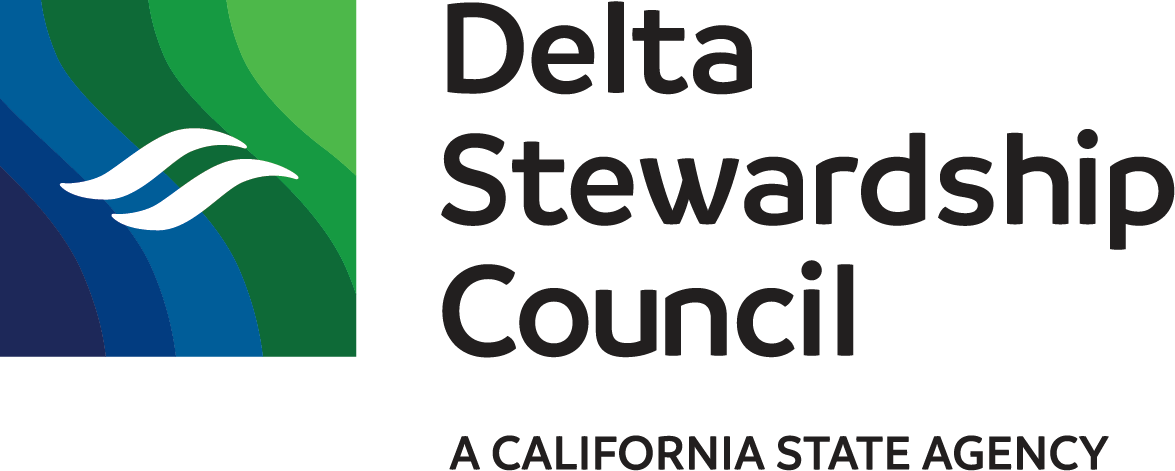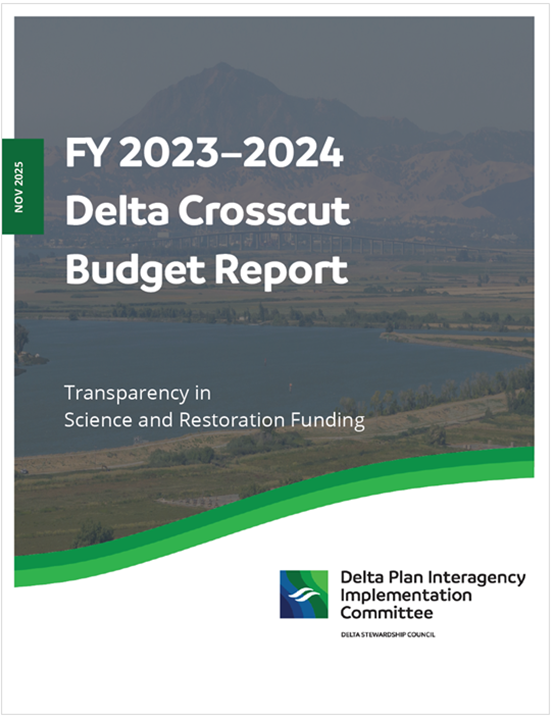DPIIC Initiatives
The Delta Plan Interagency Implementation Committee (DPIIC) has launched several initiatives to reduce barriers to restoration and strengthen the Sacramento-San Joaquin Delta science enterprise. This enterprise encompasses a wide range of science programs and activities that support decision-makers and stakeholders across the region. It includes efforts from science funding and governance to ecosystem restoration from government agencies, academic institutions, non-governmental organizations (NGOs), and the private sector.
Restoration Subcommittee
As called for in Chapter 4 of the Delta Plan and with support from the Delta Stewardship Council and the Delta Conservancy, the DPIIC has established a Restoration Subcommittee. The DPIIC Restoration Subcommittee envisions a Delta ecosystem that supports the mosaic of natural and human communities, is resilient to stressors, adapts to change, and is accessible for recreation. The Restoration Subcommittee’s work is guided by its Workplan, adopted in August 2022. The Restoration Subcommittee meets three to four times per year.
Read the Restoration Subcommittee’s information sheet to learn about progress and next steps related to restoring the Delta’s ecosystem.
Delta Restoration Forums
The Subcommittee hosts annual Restoration Forums, providing a space for Delta locals and restoration project proponents to share their perspectives and learn about developments in ecosystem restoration efforts. Three forums have been held to date, with the fourth tentatively scheduled for May 2026. See the recording from February 2023, this handout from November 2023, and the abstract book from May 2025. Please email DPIICrestorationsubcommittee@deltacouncil.ca.gov to request to view Forum materials or for any questions.
Science Funding and Governance Initiative
Recognizing the need for consistent and reliable science funding for best available science and building on discussions from the 2016 Science Enterprise Workshop, this initiative focused on understanding how science is funded, how to improve the tracking of science funding, how to increase funding for Delta science, and whether the current governance structure can efficiently meet current and future science needs. An implementation report and white paper were produced.
Delta Crosscut Budget Report
This annual reporting of Delta science and restoration expenditures, known as the Delta Crosscut Budget, implements a process for collecting data that encompasses all of the Delta and includes contributions from many DPIIC agencies.
Since 2018, the DPIIC has been working to examine science and restoration funding to achieve the following goals in the region:
- Improve efficiency: Implement common accounting and reporting protocols across funding agencies and coordinate critical review of science and restoration funding;
- Prioritize: Identify and prioritize key management questions for water resilience and science investments that guide the update of the multi-agency 2022-2026 Science Action Agenda; and
- Look forward: assess the evolving science and restoration needs in a rapidly changing environment.
These reports focus on improving efficiency; as we collect more years of data, the Delta Crosscut Budget Report will help decision-makers prioritize future science and restoration funding and help us look forward by identifying where there might be gaps in future funding needs.
As we adaptively manage the collection and reporting of science and restoration data, we will identify areas for improvement in collecting and presenting this information.
Science Needs Assessment
In the face of rapid environmental and climate change, the Science Needs Assessment looks beyond near-term efforts toward future science needs and opportunities in the Delta and Suisun Marsh. Developed by the DPIIC and the Delta Independent Science Board (Delta ISB), the Science Needs Assessment was developed via a two-day virtual workshop which considered the physical, chemical, biological, and human processes, in addition to the infrastructure needed, to integrate and support efforts for developing a bolder Delta Science Strategy that maps out forward-looking science across the Delta science enterprise. Preceding the workshop were four virtual discussions.
Collectively, the discussion series and the workshop considered:
- What do we know now about future environmental change?
- What will future decision-makers need to know?
- What science needs to be done today for decisions tomorrow?
- What needs to be done to create a science enterprise that can support a changing Delta and Suisun Marsh?
Recordings and Resources
- Advance Briefing Paper
- Pre-workshop Discussion Series Recordings (summaries below)
- Seminar 1 Summary: What do we know about projected climate change impacts for the Delta? - April 28, 2020
- Seminar 2 Summary: What questions will that raise for management decisions? What do managers need to know? - June 3, 2020
- Seminar 3 Summary: What science needs to be done to give management answers? - July 28, 2020
- Seminar 4 Summary: What changes are needed for science governance, funding, and integration to do the needed science? - September 9, 2020
- Science Needs Assessment Workshop Recordings - October 5-6, 2020
- Journal Article: Preparing Scientists, Policy-Makers, and Managers for a Fast-Forward Future
- Recommendations Report (in development)
Science Enterprise Workshop
The Science Enterprise Workshop held from November 1-2, 2016, in Davis, California, brought together scientists and science-policy experts from across the country to share information about how collaborative science is funded, managed, and communicated in several high-profile and complex ecosystems – the California Bay-Delta, Chesapeake Bay, Coastal Louisiana, Great Lakes, Greater Everglades Ecosystem, and Puget Sound. At the workshop, participants had the opportunity to hear from a wide range of experts highlighting how different regions have developed science management mechanisms to support managers working on improving the long-term health and viability of some of the nation’s high-profile ecosystems.
Documents that are not hyperlinked below are available upon request by emailing archives@deltacouncil.ca.gov.
- Workshop Recordings
- Advance Briefing Paper
- Proceedings Report
- Executive Summary
- Post-workshop Presentation to DPIIC
The Science Enterprise Workshop helped inform various Council initiatives, including the Integrated Modeling Steering Committee and Social Science Task Force.
Learn More
Questions about the DPIIC’s past and present initiatives? Please email hello@deltacouncil.ca.gov.







